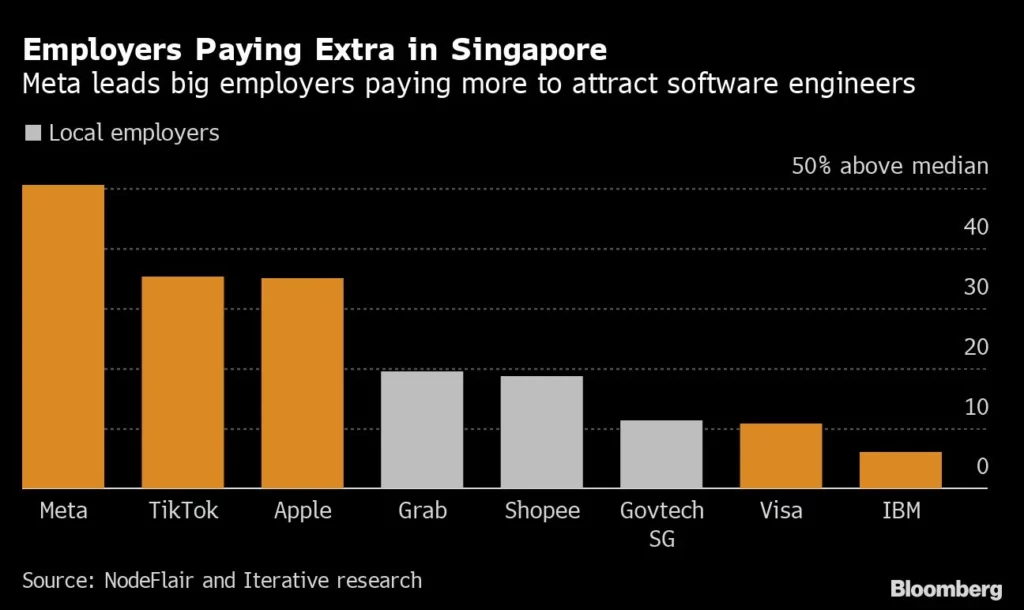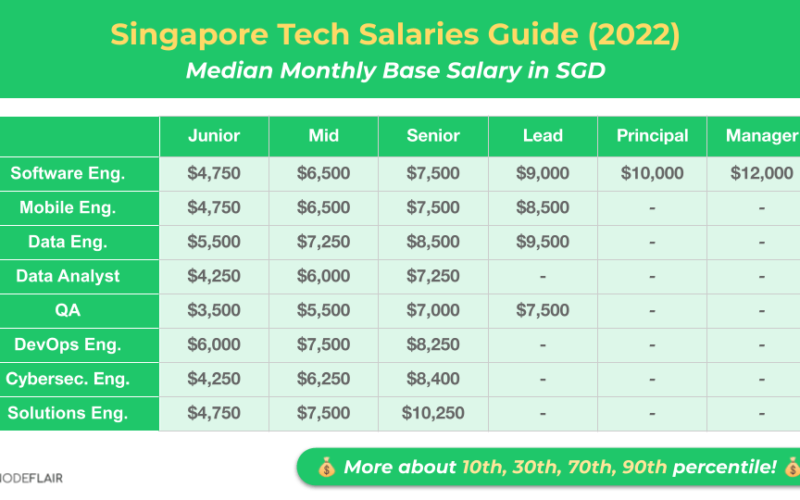Singapore’s tech industry has been booming in recent years, and so have the salaries of tech professionals. The city-state is fast becoming an innovation hub, attracting some of the world’s top talent with its dynamic lifestyle, low taxes and friendly business environment. But what exactly is behind this surge in pay for tech jobs? From skyrocketing demand to a scarcity of skilled workers, this blog post explores the key factors driving up wages in Singapore’s vibrant tech scene. So get ready for a deep dive into one of the most exciting industries in Asia-Pacific!
Introduction

There are a number of factors driving the surge in tech salaries in Singapore. The city-state has a highly developed economy and is a global financial hub, so there is strong demand for experienced tech professionals. Additionally, the Singapore government is investing heavily in developing the country’s digital infrastructure, which is creating new opportunities for tech workers. Finally, the cost of living in Singapore is relatively high, so workers are able to command higher salaries.
The combination of these factors has led to a sharp increase in tech salaries in recent years. For example, the median salary for IT professionals in Singapore rose by 11% between 2015 and 2016, according to data from recruitment firm Robert Walters. And salaries are expected to continue to rise in the coming years as demand for tech workers continues to grow.
Singapore’s Growing Tech Industry
Singapore is quickly becoming a hub for technology and innovation, with many multinational companies setting up bases here. This has led to a surge in demand for tech workers, resulting in higher salaries for those in the industry.
The government has been investing heavily in developing the country’s infrastructure and manpower capabilities, making it an attractive destination for tech companies. In addition, Singapore’s pro-business environment and favorable tax regime have also contributed to the growth of the tech sector.
As the number of tech firms operating in Singapore increases, so does the competition for talent. This has resulted in salaries for tech workers rising at a faster rate than other industries. With more big names moving into Singapore, we can only expect this trend to continue.
Factors Contributing to Higher Salaries
A number of factors are driving the surge in tech salaries in Singapore. The first is the continued growth of the city-state’s economy. This has led to an increase in demand for skilled workers, especially in the technology sector. With more companies expanding their operations here, there is greater competition for talent. This has pushed up salaries, especially for those with in-demand skillsets.
Another factor contributing to higher salaries is the growing nascent startups scene in Singapore. These startups are often willing to pay top dollar for experienced talent to help them get off the ground. This has driven up salaries across the board, as companies compete for the best workers.
Finally, another driver of high tech salaries is the simple fact that Singapore is an expensive city to live in. The cost of living here is among the highest in the world, and this includes costs associated with housing, transportation, and other essentials. As a result, companies need to offer higher wages just to attract workers to the city-state.
The Effect on Job Seekers in Singapore
The tech industry in Singapore is booming, and with that comes an influx of job seekers looking to cash in on the high salaries. While this is great news for those with the right skill set, it can be a daunting prospect for those who don’t feel they have the necessary experience or qualifications.
There is no doubt that the competition for jobs in Singapore’s tech industry is fierce. With so many people vying for the same roles, employers can afford to be picky and only hire the very best. This can leave job seekers feeling like they’re at a disadvantage, but there are ways to stand out from the crowd.
One way to make yourself more attractive to potential employers is to upskill. If you don’t have the required qualifications for a role, take some time to learn new skills or get certified in the relevant area. This will show employers that you’re willing to invest in your own development, and it could give you the edge over other candidates.
It’s also important to stay up-to-date with the latest industry trends. Keep abreast of new developments and technologies, and make sure you’re familiar with the latest tools and platforms. Employers value candidates who are proactive about keeping their skills current, so this is another way to make yourself stand out from the pack.
Last but not least, don’t forget the power of networking. Get connected with people in your industry, attend events and meetups, and build up your professional
Challenges the Tech Industry Faces
The tech industry in Singapore is facing a number of challenges. Firstly, the cost of living in Singapore is high, which makes it difficult for companies to attract and retain talent. Secondly, the market for tech talent is becoming increasingly competitive, with countries like China and India offering salaries that are significantly lower than those in Singapore. Thirdly, the Singapore government has been relatively slow in granting work visas to foreign tech workers, which has made it difficult for companies to hire the workers they need. Fourthly, the education system in Singapore does not produce enough qualified graduates to meet the needs of the tech industry. Finally, many young people are choosing to leave Singapore in search of better opportunities elsewhere.
Solutions to Address These Challenges
The tech industry in Singapore is booming and salaries are on the rise. However, there are some challenges that need to be addressed in order to sustain this growth.
One challenge is the lack of experienced talent. With the rapid growth of the tech industry, there is a shortage of experienced professionals. This is driving up salaries as companies compete for scarce talent.
Another challenge is the cost of living in Singapore. The high cost of living makes it difficult for tech workers to save money and can cause burnout.
Finally, there is a need for more support services for tech workers. These include things like childcare, mental health support, and financial planning services.
There are several solutions that can address these challenges:
1) Tech companies need to invest in training and development programs to help grow their internal talent pipelines.
2) Companies should offer stipends or relocation packages to help offset the cost of living in Singapore.
3) Support services should be provided by both companies and community organizations to meet the needs of tech workers.
Summary and Conclusion
In Singapore, the median monthly salary for a tech professional is S$5,000, which is a 20% increase from 2018. The average monthly salary for a tech professional in Singapore is S$6,500. The highest-paid tech professionals in Singapore earn an average of S$12,000 per month.
There are several factors driving the surge in tech salaries in Singapore. Firstly, the demand for tech talent in Singapore has been increasing at a rapid pace. The city-state has been transformed into a global hub for technology and innovation, and this is attracting many top tech talents from all over the world. Secondly, the cost of living in Singapore is relatively high, which means that companies need to offer higher salaries to attract and retain top tech talents. Finally, the competition for top tech talents is intense, and this is pushing up salaries even further.
Overall, the surge in tech salaries in Singapore is good news for professionals who are looking for opportunities to boost their earnings. However, it also means that companies will need to invest more heavily in talent acquisition and retention strategies.







